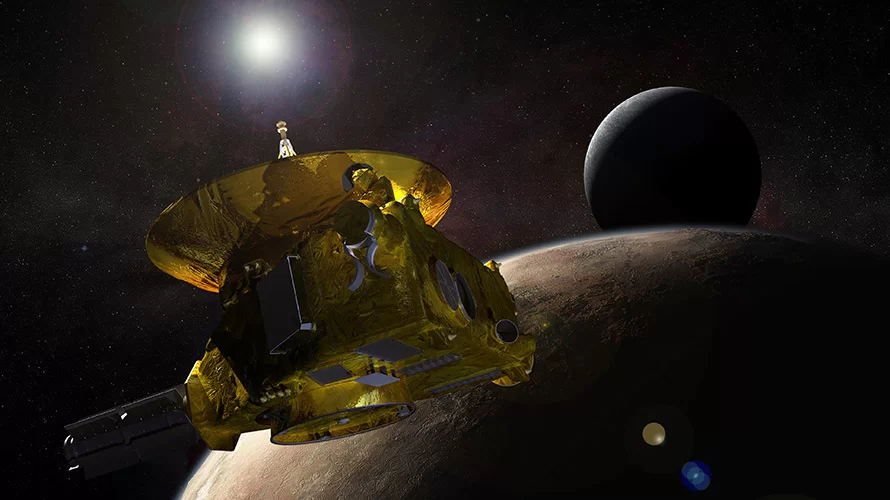NSS Joins with Beyond Earth Institute and Space Frontier Foundation to Prevent Devastating Budget Cuts
The National Space Society recently joined forces with the Beyond Earth Institute and the Space Frontier Foundation to encourage NASA to rethink budget cuts to New Horizons, one of the most successful deep-space robotic missions in NASA’s storied history. The joint NSS/Beyond Earth/Space Frontier Foundation letter was sent to NASA and Congressional leadership on September 13.
The New Horizons spacecraft was launched in 2006 and flew past Pluto in 2015, the first probe to do so. It then swung past a planetoid called Arrokoth in the Kuiper Belt, the vast region surrounding the outer solar system, in 2019. Massive amounts of scientific data were returned from both encounters, and more continues to come in from the furthest reaches of the solar system as the spacecraft continues to fly in excellent health, by some estimates capable of operating until at least 2050.
“New Horizons has flown a brilliant, near-flawless mission to some of the harshest regions in space,” said Hoyt Davidson, NSS Executive Vice President. “It continues to operate well and is returning data from regions never explored. Unfortunately, NASA has decided to cut funding to this modestly budgeted mission, and the National Space Society is doing its best to see that this does not occur.”
Specifically, NASA’s Science Mission Directorate (SMD), charged with implementing budget cuts for the upcoming year, selected New Horizons as one of the missions to be downscaled. The resulting cuts would dismiss the scientists who have successfully overseen the mission since its launch and replace them with a new team that would operate at a much lower level, with resulting savings of only about $2-3 million.
Mission Principal Investigator Dr. Alan Stern said, “New Horizons is the only spacecraft in the Kuiper Belt, and the only one currently planned to go there. We have valuable new Kuiper Belt observations, and a search for a new flyby target, still to complete every year until we leave the Belt. Quitting this exploration prematurely, after spending nearly $1 billion to get New Horizons to the Kuiper Belt seems to many of us to be tragically mistaken, a poor use of taxpayer money, and a lost scientific opportunity that can never be recovered from.”
To address this, NSS leadership joined with leaders from Beyond Earth Institute and the Space Frontier Foundation to circulate a petition on Change.org to encourage NASA and the SMD to seek cuts elsewhere. The petition gathered over 7,000 signatures and numerous donations. This comes after a letter signed by a dozen notable space leaders and citizen scientists, including Queen’s Brian May, Carl Sagan’s widow Ann Druyan, former NASA Deputy Administrator Lori Garver, and Bill Nye, was sent to NASA leadership protesting the cuts.
NSS COO Dale Skran added, “While we understand NASA’s need to respond to a reduced overall budget, the decision to cut New Horizons funding seems shortsighted. We support the agency and laud its goals, but the effects of these cuts would be so overwhelming for science and eventual space settlement, and the savings so meager, that it seems apparent that these small sums could be trimmed from other, larger programs able to better withstand such reductions in funding.” Skran continued, “NSS has a long history of space activism and of influencing policy in spaceflight decisions in the U.S., and we hope this will be one more example of U.S. citizens and taxpayers helping to guide decision-making at the highest levels.”
The joint letter included the results of the successful petition and indicated strong support from the general public as well as the pro-space organizations who partnered on the document.




















1 thought on “NSS Pushes to Prevent Dramatic Downgrade of New Horizons Science Mission”
COUNTRIES THAT QUIT EXPLORING QUICKLY BECOME SECOND AND THIRD RATE POWERS! History says so.